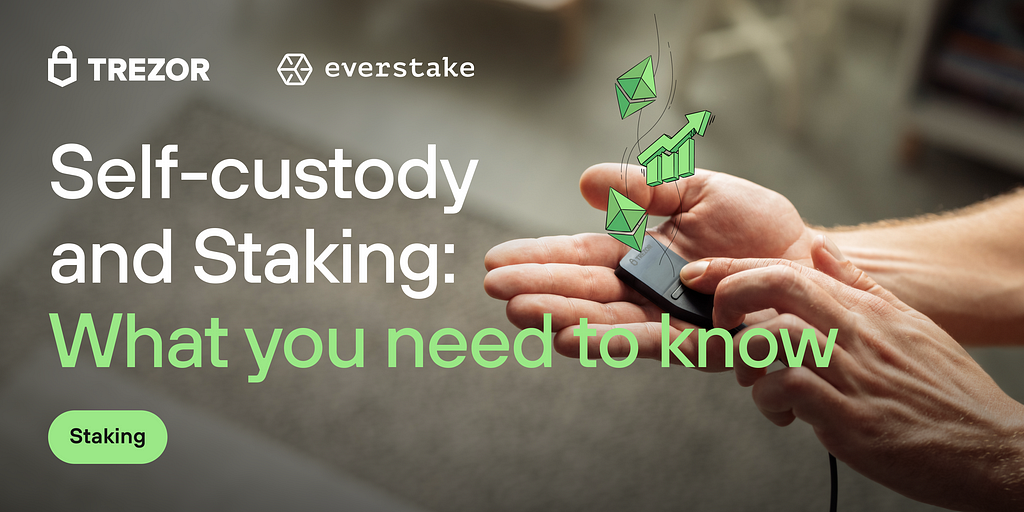Latest news about Bitcoin and all cryptocurrencies. Your daily crypto news habit.

Key takeaways
- Using a Trezor wallet ensures your private keys and coins remain secure offline; however, engaging with smart contracts introduces a trust element in the smart contract owner, which in the case of ETH Staking, is our partner Everstake and not Trezor.
- Trezor’s partnership with Everstake for ETH staking is backed by independent audits, aiming to provide a trustworthy staking service.
- Also, unless you run the node and the validator yourself, which is not an easy thing to do, you need to depend on the security of the provider.
Introduction
Trezor was born at a time when there was only bitcoin, a vastly different landscape from today. There were no (wannabe) decentralized apps aka DApps, no smart contracts, and no DeFi.
Trezor was created with just one purpose — to store your coins safely, offline. That purpose continues. Only if you need to transfer your coins somewhere else, you plug in your Trezor, confirm a transaction, and off it goes. With the introduction of many new coins such as ETH (Ethereum) or SOL (Solana), came the advent of “smart contracts”, adding layers of functionality and complexity to the space.
With that background, here’s what you need to understand:
- For ETH (Ethereum) holders, using a self-custody solution like a Trezor hardware wallet extends peace of mind. Your private keys remain secure offline when your Trezor is disconnected. They never get out unless you confirm the transaction on the trusted display.
- On the other hand, when it comes to interacting with smart contracts, there’s a change (and, this applies even in the case of your ETH, for example, held in a hardware wallet). This involves trusting the smart contract. Even though you can technically audit a smart contract (and you should!) before engaging, it’s not straightforward unless you’re a seasoned expert. While many claim these contracts to be decentralized, a vast majority of them have the option to be upgraded and/or allow the owner of the smart contract to change various parameters of the contract, which can introduce risks.
Navigating the world of Staking
Staking comes with its nuances, especially when dealing with protocols like Ethereum and Solana, where running your node and validator is the most secure method. This, however also makes it the least practical for most users. Hardware demands and high stakes — like Ethereum’s 32 ETH minimum — place it out of reach for the average user.
To bridge this gap, “pooling” services have emerged, As the name suggests, this allows users to combine their assets to meet staking requirements. However, this convenience comes at the cost of depending on the pooling service provider’s security.
Partnering with Everstake
At Trezor, we strive to make crypto security easy. For the better or worse, staking is part of that. That’s why we’ve partnered with Everstake, a top-tier staking provider with over 6 years of track record, and trusted by over 735,000 investors. Currently, they have over $1.5 billion ETH staked with them. The Everstake platform has undergone two independent audits by ChainSecurity and Ackee Blockchain Security, leading firms in smart contract security.
In summary,
- Using a smart contract for “pooling” staking alters the trust model slightly.
- With Trezor, when your device is off, and your ETH isn’t staked, your coins are 100% offline as the private keys are secured by your hardware wallet.
- However, when you stake your ETH, your assets remain under your control, with the added element of putting your trust in Everstake.
We trust Everstake wholeheartedly and recommend them as the premier choice for safeguarding your staked assets.
What’s more? Staking with Trezor also ensures that once you decide to unstake, all staking rewards are immediately secured by your Trezor device, offering what we believe to be the best possible solution in the Proof-of-Stake landscape.
Self-custody and Staking: What you need to know was originally published in Trezor Blog on Medium, where people are continuing the conversation by highlighting and responding to this story.
Disclaimer
The views and opinions expressed in this article are solely those of the authors and do not reflect the views of Bitcoin Insider. Every investment and trading move involves risk - this is especially true for cryptocurrencies given their volatility. We strongly advise our readers to conduct their own research when making a decision.